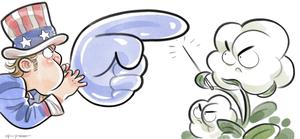 Western brands foolish to be a cat's paw
.jpg
Western brands foolish to be a cat's paw
.jpg
If we have a philosophical approach to business or life, we will realize that the choices we make are an attempt to strike a balance between what we want as companies or individuals and its impact on the society we live in and the people around us.
For example, with respect to human rights and freedom, the right to safety and the right to pursue a better life sound highly appealing. But some people feel that their individual rights supersede the needs and interests of the society in which they live. That individual rights matter more than anything else is the hallmark of cancerous neoliberal thinking, which leads to chaos and instability.
Why? Because, you eventually end up trampling on the rights of others by insisting that you have the right to do what you want simply because you think it is right.
The time of being silent and humble, of turning the other cheek as the Bible says, is gone. Staying silent is not an option in the face of being continuously slandered
In particular, for brands providing products and services for consumers in a global marketplace, such choices and priorities can become far more complicated. At times a brand feels compelled to make a political statement or respond to criticisms against its new advertisement that has triggered a controversy. When that happens, the brand can find itself, for better or worse, facing a tide of irate consumers boycotting the brand, leading to a potential loss of millions of dollars in revenue and goodwill.
In China, there is no shortage of such stories. Companies such as Dolce& Gabbana have learned this the hard way when consumers threatened to boycott their goods against their culturally insensitive videos promoting a runway show in Shanghai with "chopsticks" ads.
Airlines including Delta and American, and fashion retailer Zara have also got themselves into trouble for mistakenly referring to Taiwan as a country rather than a part of China.
Let us not forget that such global brands hire highly reputable and expensive public relations agencies to help them navigate the world of communication to reach their "message" to the general public.
So it is natural to assume that global brands would not make the foolish mistake of being seen as part of the treacherous Western propaganda campaign of accusing China of a host of supposed offenses including the genocide of Uygur minorities, and forced labor, forced abortion and forced sterilization in the Xinjiang Uygur autonomous region of China.
Judging by the news of the boycott of H&M and Nike, however, it seems foreign brands may never be able to read the pulse of Chinese consumers. For one, they don't know that the Uygur population in Xinjiang has grown by 25 percent over the past 40 years, and the Uygur Muslim community has been thriving because of the preferential policies they enjoy. Such good news doesn't stop those with ulterior motives from continuing their efforts to smear and demonize all things Chinese.
Which brings us to last week's H&M episode. Some H&M executives thought it would be a good idea to level false accusations against China, by issuing an "official" statement saying that while the company hugely benefits from pocketing Chinese consumers' money, they definitely don't trust the Chinese government's statement that the Uygur cotton field workers in Xinjiang are not slave laborers. Perhaps H&M thought China was like the United States when black slaves were forced to work on cotton plantations.
While the statement by H&M was issued last year without much fanfare, last week's disgraceful decision by the European Union and the United Kingdom to officially sanction some Chinese government officials for non-existent offenses acted as a catalyst to what followed, because the Chinese people and the Chinese government can no longer tolerate these reprehensible insults.
Some Western countries' attempt to escalate this vicious political propaganda against China was bound to reach this point, known in Chinese language as "going over the line" which in Mandarin is guofen le.
The Chinese government and people have refuted the false accusations, and the Chinese government has rightfully chosen to impose sanctions on some British politicians and organizations that made such accusations. Chinese netizens, who act as the wind in this righteous sail, have now also risen up to defend China against propagators of fake news and false accusations.
The time of being silent and humble, of turning the other cheek as the Bible says, is gone. Staying silent is not an option in the face of being continuously slandered.
The fact is, China is the world's safest, most stable, successful and capable country. It has risen up to become a new world leader, and takes that responsibility seriously. It is also a country that will no longer suffer insults.
The author is an American writer living in China and senior fellow at the Center for China& Globalization.
The views don't necessarily represent those of China Daily.


